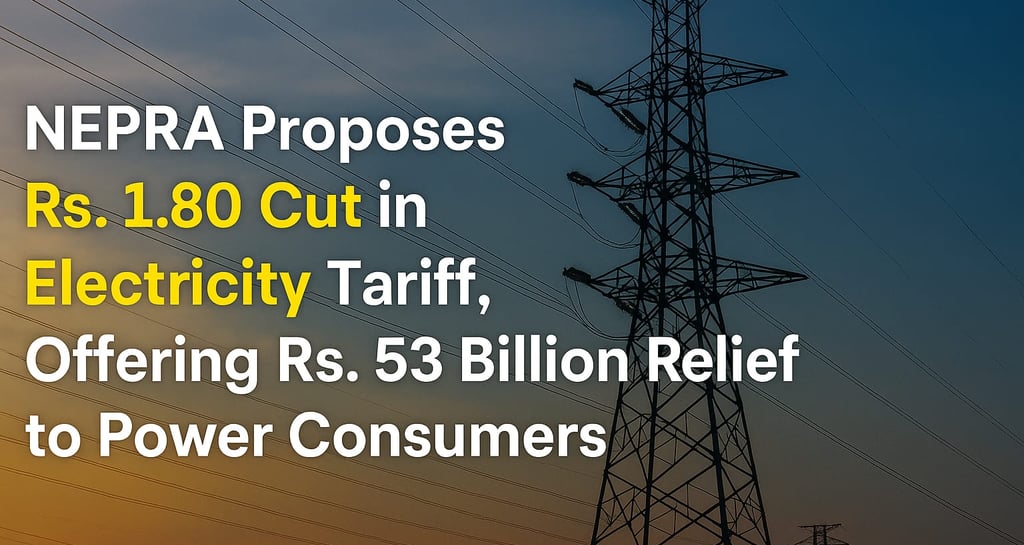NEPRA Proposes Rs. 1.80 Cut in Power Tariff – Rs. 53 Billion Relief for Consumers
NEPRA proposes Rs. 1.80/unit electricity tariff cut for April–June 2025 QTA, offering Rs. 53B relief to Pakistani consumers. Full details and expert views.
Raja Awais Ali
8/5/20252 min read


NEPRA Proposes Rs. 1.80 Per Unit Electricity Tariff Cut, Promising Rs. 53 Billion Relief for Consumers
On August 5, 2025, the National Electric Power Regulatory Authority (NEPRA) proposed a reduction of Rs. 1.80 per unit in electricity tariff under the Quarterly Tariff Adjustment (QTA) for the April–June 2025 quarter. This move could bring substantial relief of Rs. 53.39 billion to power consumers across Pakistan. The proposal was submitted by the Central Power Purchasing Agency (CPPA-G) on behalf of all ex-WAPDA distribution companies (DISCOs), aiming to reduce power costs for both residential and commercial users. NEPRA held a detailed public hearing in Islamabad, where energy experts evaluated the proposal’s implications on electricity bills and the overall energy sector.
The total proposed relief amounts to Rs. 53.714 billion, with a significant portion attributed to savings in capacity payments. Additionally, improvements in transmission and distribution efficiency contributed to Rs. 660 million in cost reductions. Notably, the circular debt has declined from Rs. 2.3 trillion to Rs. 1.6 trillion, indicating improved financial management within the energy sector. If approved, the adjustment will apply to all DISCOs, including K-Electric. However, lifeline customers, electric vehicle charging stations, and prepaid meter users will be excluded from this relief. Consumers could begin to see the impact of this change reflected in their August or September 2025 electricity bills.
This is not the first tariff relief in 2025. In June, NEPRA approved a Rs. 1.50 per unit cut in the base tariff, and K-Electric consumers received a Rs. 4.03 per unit relief under the Fuel Cost Adjustment (FCA). These developments indicate a broader policy shift toward easing the burden of rising energy costs on the public. Industry analysts have praised NEPRA’s move as a positive economic signal. With inflation pushing up the cost of living and energy being a major household expense, the proposed tariff cut could offer welcome support to both citizens and local businesses. Experts attribute this progress to better fuel sourcing strategies, transmission efficiencies, and a reduction in circular debt.
Energy sector reforms under the current administration are being viewed as a turning point. Key strategies include reducing dependence on imported fuel, improving recovery from defaulters, and ensuring greater transparency in electricity billing. If executed effectively, this proposed tariff cut could not only benefit consumers but also boost investor confidence and attract international support for Pakistan’s energy initiatives. The government has pledged to review electricity tariffs on a quarterly basis to ensure that cost savings are passed on to end users in a timely and transparent manner.
In conclusion, NEPRA’s proposed Rs. 1.80 per unit reduction in electricity tariff represents a significant relief for millions of Pakistanis struggling with high utility bills. The Rs. 53 billion relief package reflects real progress in the country’s energy sector and may signal the beginning of more consumer-focused reforms in the near future.